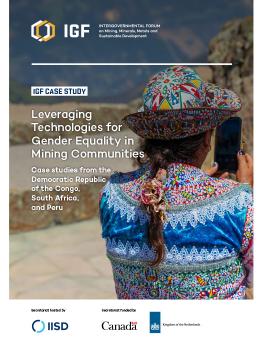
IGF Case Study: Leveraging Technologies for Gender Equality in Mining Communities
Case studies from the Democratic Republic of the Congo, South Africa, and Peru
How can sharing technological infrastructure support gender equality and serve the broad betterment of mining communities?
While it has become an accepted practice for mining companies to share roads, electricity, and other traditional infrastructure with nearby rural communities, sharing new technological infrastructure, such as Internet access and mobile phone reception, is a more recent development.
This publication looks at how sharing technological infrastructure can support gender equality and serve the broad betterment of mining communities. It illustrates how mining companies in South Africa and the Democratic Republic of the Congo (DRC) are sharing technological infrastructure with local communities and how partners are collaborating in Peru to add stakeholder voices to mining-related impact measurements.
This research shows that while programs might not be initially designed exclusively for women, an unintended consequence of making the technology available to all is that women who are traditionally underserved in technology and technological infrastructure benefit from its presence.
You might also be interested in
Women and the Mine of the Future
Uncovering the gender-disaggregated employment profile for large-scale mining, focusing on women and their occupations in 12 countries.
ASGM Tailings Management and Reprocessing Governance
This report outlines technical aspects, governance frameworks, and policy recommendations for artisanal and small-scale gold mining (ASGM) tailings management and reprocessing.
IGF Mining Policy Framework
A compendium of best practices for governments to manage the full range of issues in the mining sector.
Parental Leave Policies in the Mining Sector
An in-depth look at international and national parental leave frameworks and policies across 12 countries.